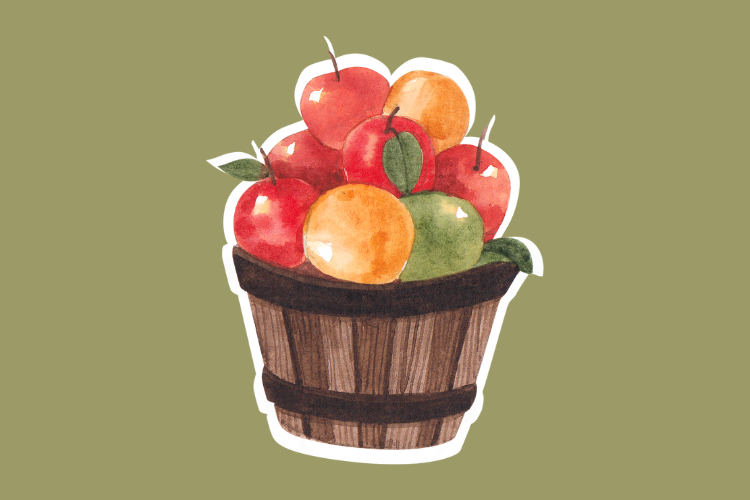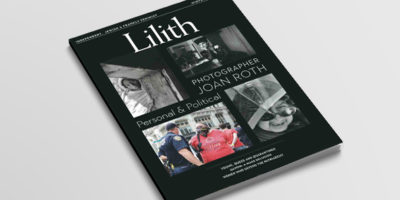
The Lost Taste of an Apple
I MOURN THE TASTE OF APPLES—tart-sweet, honeyed. I can still feel the crisp fine flesh in my mouth, but all taste is gone, along with the tang of cinnamon, rich coffee, and spicy tea. Irish oatmeal is simply horsey hot texture, toast is hot cardboard even spread with “butter,” pretzels mere crunch except for crumbs of “salt.” While Covid-19 robbed me of this cherished sense, I was never hospitalized or in grave danger. Although I was very sick and in pain, I was rarely frightened, because my doctor for over 30 years—despite his 16-hour days at the hospital—called or texted me two or three times daily to check on my breathing, oxygen levels, and symptoms. On my worst night, I woke bathed in sweat imagining a mortuary I.D. tag being fastened to my big toe and found myself desperately chanting, “I will not be dead, I will not be dead, I will not.”
After the fever subsided, my enduring symptom was pleuritis—inflammation of the lining of my left lung scarred from previous lung cancer surgery—painful, debilitating, persisting over weeks—but causing no respiratory deficits, so I was quite fortunate. Yet just sitting up for two or three hours to read sends me back to the comfort of my quilt.
Despite my missing sense, I’m grateful for the other four: The sight of emerald philodendron trailing down the sunlight that floods the rich blue walls of my quarantine bedroom; the virtuoso robin who sings all night in an unseen tree outside my window; the daily get-well phone call from Jane, my best friend of 50 years. Though we can no longer exchange morning hugs over lattes and almond croissants at the Silver Moon Bakery, we exchange book tips and grandchild first-steps and new-tooth news long-distance. And as I slowly heal, my needle pulls shining scarlet thread through the quilt I’m embroidering with the names of the children and grandchildren in our family.
Before I got sick, I never felt imprisoned at home during the Lockdown: It offered precious time with my busy litigator husband and opportunities to launch valued projects: to give the final polish to my sixth novel; to finish quilts started 30 years ago; to begin painting for the first time; to enjoy challenging books, which sustained me when I could do nothing but read; to sew colorful masks for the whole family.
Long ago I read that one should be able to live a lifetime in one room without getting bored. I’ve spent my life developing the resources to do that. More than 30 years of living with a painful neurological illness that often forced me into solitude helped me develop those skills. The books in my library speak to me like intimate friends, and outside my windows Iseek an ever-shifting skyscape of clouds and atmosphere; a cityscape of rooftops, water towers, and other people’s windows to scrutinize; the ever-shifting colors of the Hudson River—and the George Washington Bridge—white, black, silver—and especially breathtaking at night. I long for the energy to paint it.
Even lying in bed, another sense channels the soundscape of the city: the syncopated punctuation of now-infrequent cars and buses; the vivid alarms of ambulances; the chatter of dozens of sparrows in the “bird-apartment houses” in the 10-inch space between our tall building and the next; the nightly ear-splitting shriek of one motorcycle blasting through the midnight silence; the radiant song of that one robin. Perhaps best of all, the zany seven o’clock hullabaloo in honor of all the front-liners, medical and otherwise: a cacophony of cowbells, clapping, one droll saxophone, whoo-hoo’s, and random heartfelt yelling.
For many days, that racket woke me in my bed and I could only smile; recently, I made it to a window and rang my cowbell leaning against a wall, feeling a tiny part of the generous energy of my neighbors pouring out their gratitude in that shared five-minute burst of love. In some strange way, that energetic dissonance entered into me as healing. It reminded me that we are all alone together: that gratitude is the ground base I connect with and will continue to draw strength from—like water from a well of sound.
Now I sit staring into the scarlet blossoms of a geranium I placed in the center of our dining table to brighten our quiet meals. I nursed it on a windowsill all winter till it finally broke into exuberant bloom three weeks ago. The crimson is almost fluorescent; I can taste the color despite my lost sense—strong and spicy, hardly shy. I see each large blossom is made of many flirty florets, framed with broad velvet leaves in three, no four— five?—shades of spearmint green.
For me, there will be no end of exploration, even in this small room—even without the honeyed taste of apples, the tang of cinnamon, or the bite of salt.




